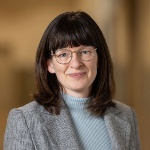In today’s world, electronic computational devices are present everywhere around us. While they have proven to be a great driving factor for societal progress, computers have also started to contribute significantly to the global energy consumption. “More radical ideas to change the nature of the bits, the 1’s and 0’s, used in computational devices have recently been gaining ground. Proposals like quantum computing and spintronics (computers built out of magnetic circuitry) replace the electric current used in today’s electronics by magnetic signals instead. The large benefit that magnetic signals have over electric currents is that they are not susceptible to resistance and therefore are much more energy efficient”, says Dr. Lukas Veldman, post-doctoral researcher at the Institute for Functional Matter and Quantum Technologies (FMQ) at the University of Stuttgart. “While the idea of quantum computing is still in the very early stage of development, recent proof of concept measurements have been promising”, says the surface physicist.
Magnetic molecules: A promising building block for quantum applications
“To build magnetic circuitry, we need to understand how these signals travel through materials, from one molecule to the next. In Stuttgart, we do this by isolating a single magnetic molecule and study how it interacts with its environment. The goal is to be able to control the magnetic moment via these interactions and build circuits out of a few coupled molecules.”
Veldman is currently working on a series of elaborate quantum experiments with which he hopes to clarify fundamental questions about the magnetic properties of certain classes of molecules. “Currently, our main goal is to understand how the tiny magnetic moments in molecules interact with each other and with their environment. These interactions are governed by the laws of quantum mechanics and have proven to be quite delicate and complex. Once fully characterized, we aim to use them to gain complete control over the magnetic properties of the molecules and start building conceptual devices for quantum computing and spintronics.”
Stuttgart technologies make atomic processes visible
These types of experiments studying single molecules are made possible by a class of remarkable instruments: scanning probe microscopes. These machines can zoom in so far that the individual atoms that make up matter become visible. “Our microscopy techniques are sensitive to the quantum dynamics of atoms and molecules. We can reveal previously unseen details and gain critical insights for novel technologies that operate at the atomic level," says Prof. Dr. Sebastian Loth, managing director of the FMQ and fellow of the Center for Integrated Quantum Science and Technology (IQST), Stuttgart.
Veldman, originally from the Netherlands, already developed expertise with this highly specialized microscopy technique during his doctoral thesis at the TU Delft. There, he studied magnetic interactions between individual atoms. “During my doctoral studies I used innovative techniques that were introduced to the field by two people: Prof. Sebastian Loth and Dr. Susanne Baumann. They both work in Stuttgart, so I knew where I had to go next.”
A promising young talent from abroad sets his sights on Stuttgart
Veldman has been awarded a prestigious two-year Humboldt Research Fellowship for postdoctoral researchers to support his Stuttgart project. Through this fellowship program, the Alexander von Humboldt Foundation supports outstanding international scientists, allowing them to conduct research in Germany. Veldman deliberately chose the University of Stuttgart as his host institution. “Stuttgart offers an ideal environment for quantum researchers. I work here in a state-of-the-art laboratory and am part of a strong quantum community.”
In Stuttgart, Veldman is part of the Loth Group, which consists of 15 scientists from six countries. “In our research group, we test physical limits of miniaturization and study the emergence of quantum behavior in magnetic nanostructures and correlated-electron materials”, says Prof. Loth. “Lukas is a rising star in scanning probe science and we’re happy that he chose Stuttgart for his Humboldt fellowship.”
Further information
January 2025
November 2024
September 2024
August 2024
July 2024
June 2024
May 2024
April 2024
March 2024
September 2023
August 2023
July 2023
April 2023
February 2023
August 2022
July 2022
January 2022
December 2021
July 2021
April 2021
Prof. Dr. Stefanie Barz in conversation with Dorothee Bär, German Minister of State for Digitization
March 2021
February 2021
January 2021
December 2020
October 2020
June 2020
May 2020
March 2020
February 2020
January 2020
December 2019
November 2019
October 2019
September 2019
August 2019
July 2019
February 2019
November 2018
October 2018
September 2018
August 2018
June 2018
April 2018
February 2018
January 2018
December 2017
November 2017
April 2017
January 2021
Contact

Lena Jauernig
Editor Research / Early Career Researchers





